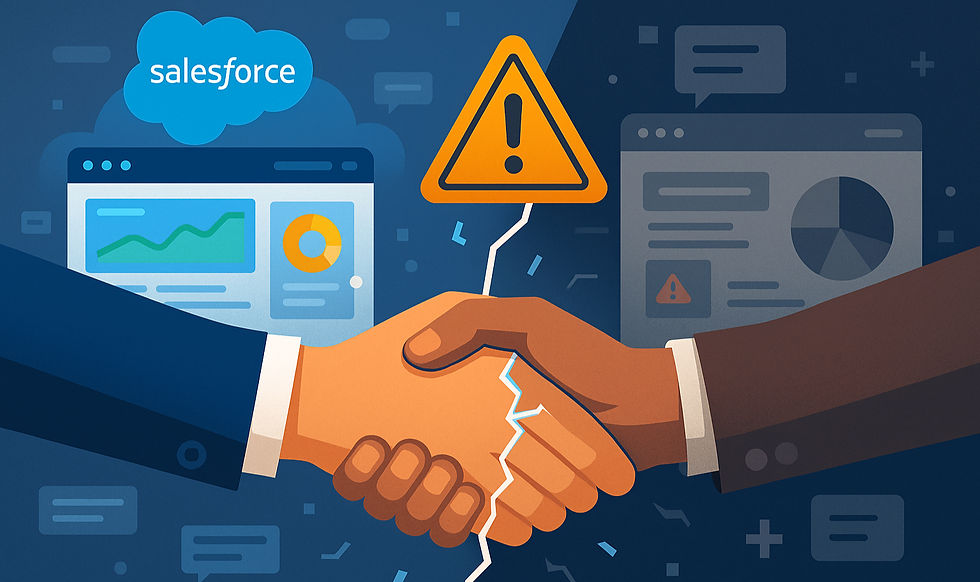5 Warning Signs Your Salesforce Partner No Longer Fits Your Business
- Implementology io
- Oct 8, 2025
- 4 min read

Your Salesforce partner plays a crucial role in how well your CRM supports your business. The right partner helps your teams work efficiently, close deals faster, and deliver better customer experiences.
But as your business grows, your needs evolve. Sometimes, your Salesforce partner doesn’t evolve with you. When that happens, your CRM can start feeling slow, outdated, or disconnected from your goals.
Here are five signs that it may be time to rethink your current Salesforce partnership — and how to find one that truly supports your growth.
1. You’re Not Seeing Measurable Results
If Salesforce isn’t helping you reach your goals or improve productivity, it’s a red flag.
A good Salesforce setup should help you manage leads, track performance, and get insights that drive decisions. If your CRM feels like more work than it’s worth, your implementation might not be aligned with your business strategy.
A strong partner will:
Understand your business goals before configuring Salesforce.
Build dashboards that actually reflect progress.
Continuously review and optimize your setup.
When your Salesforce partner focuses only on technical tasks instead of business outcomes, your ROI suffers. Many organizations experience this — not because Salesforce is the problem, but because their system wasn’t set up with growth in mind.
That’s where a strategic consulting approach makes a difference. Partners like Implementology specialize in helping businesses transform underperforming Salesforce systems into streamlined, insight-driven tools that deliver measurable results.
2. Your System Is Always Glitchy or Slow
If your team is constantly facing bugs, delays, or confusing workflows, your Salesforce environment might not be properly maintained.
This usually happens when:
Updates are missed or not applied correctly.
Customizations were added without a plan.
Data management practices are poor.
A reliable partner should proactively maintain your system — applying updates, fixing integrations, and keeping everything optimized.
When your CRM becomes a source of frustration instead of efficiency, it’s a clear sign your partner isn’t doing enough to keep things running smoothly.
3. Communication Has Become Reactive
A great Salesforce partner should feel like part of your team — not a support line you contact when something breaks.
If communication has slowed down or your partner only responds to emergencies, you’re missing the proactive guidance that helps you grow.
You deserve a partner who:
Checks in regularly and provides updates.
Suggests improvements before problems arise.
Helps you make the most of new Salesforce features.
When communication fades, alignment fades too. A collaborative approach keeps your Salesforce environment evolving with your business.
4. You’ve Outgrown Their Expertise
Salesforce has expanded far beyond basic CRM — it now includes AI tools, automation, and integrations with platforms like Slack.
If your partner isn’t guiding you through these advancements, they might be holding you back.
For example, maybe you want to:
Automate repetitive sales or service tasks.
Connect Slack for faster internal communication.
Use Salesforce AI to predict trends.
A forward-thinking partner helps you take advantage of these capabilities to scale smarter.
If your current partner’s expertise hasn’t kept up with your ambitions, it’s time to find one who can lead you through the next stage of your Salesforce journey.
5. Support Stops After Go-Live
Salesforce isn’t a “set it and forget it” system. It requires ongoing care and improvement.
If your partner disappears after implementation — or charges extra for every small adjustment — that’s a major warning sign.
True success comes from:
Continuous monitoring and updates.
Ongoing optimization as your business changes.
Training your team to use Salesforce effectively.
Without consistent support, your CRM will quickly become outdated, and your team will lose confidence in it.
That’s why companies choose Implementology — a team that not only sets up Salesforce right but ensures it keeps working right. We help growing businesses refine their systems, align them with business goals, and keep them efficient for the long run.
When It’s Time to Make a Change
If several of these signs sound familiar, it may be time for a new Salesforce partner.
Switching partners doesn’t mean starting from scratch — a capable consultant can audit your existing setup, identify what’s working, and optimize what’s not.
A fresh perspective can bring your CRM back to life and unlock potential you didn’t realize was hidden behind outdated processes or poor configuration.
FAQs:
1. How do I know if my Salesforce partner isn’t performing well?
If your system feels outdated, underused, or disconnected from your goals, that’s a clear sign your partner may not be maintaining it effectively.
2. Can I switch partners without losing progress?
Yes. A new partner can take over your setup, fix issues, and optimize performance — all while keeping your operations running smoothly.
3. How often should I review my Salesforce setup?
At least once a year, or whenever your business changes significantly. Regular reviews ensure your CRM grows with your needs.
4. What should I look for in a new Salesforce partner?
Choose one with certified experts, transparent communication, and a track record of improving business outcomes — not just completing technical tasks.
Final Thoughts
Your Salesforce partner should be a long-term growth ally — not just an implementation vendor.
If you’re not seeing value, communication is lacking, or your partner can’t meet your evolving needs, it’s worth exploring a change.
With the right partner, Salesforce becomes a true driver of efficiency, productivity, and customer success — helping your business stay agile and competitive in a changing market.
.png)




Comments